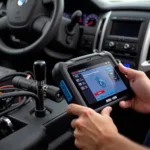Keeping your computer’s drive clean is crucial for optimal performance. Using tools to scan drive for junk files can help reclaim valuable storage space and improve your system’s speed. This article will explore the various options available, from built-in utilities to dedicated third-party software.
What are Junk Files and Why Should You Remove Them?
Junk files are temporary files, cached data, and other unnecessary clutter that accumulates on your hard drive over time. They can include browser history, cookies, temporary internet files, leftover files from uninstalled programs, and more. These files not only take up precious storage space but can also slow down your computer, making it sluggish and less responsive. Regularly scanning your drive for junk files and removing them is essential for maintaining a healthy and efficient system.
Cleaning up these files can lead to:
- Increased storage space
- Improved system performance
- Faster boot times
- Reduced system errors
You can achieve this by utilizing effective tools to scan drive for junk files. Some are built-in within your operating system, while others are third-party applications that offer more advanced features.
After running a disk cleanup, remember to empty your recycle bin! This will free up the space occupied by the deleted files.
Built-in Tools to Scan Drive for Junk Files
Most operating systems come equipped with built-in tools for basic disk cleanup. In Windows, you can use Disk Cleanup, a utility that identifies and removes unnecessary files.
How to use Disk Cleanup:
- Open the Start Menu and search for “Disk Cleanup.”
- Select the drive you want to clean and click “OK.”
- Check the boxes next to the file types you want to remove, such as temporary files, downloaded program files, and recycle bin.
- Click “OK” to start the cleanup process.
For macOS users, the “Optimize Storage” feature helps manage storage space by removing unnecessary files and optimizing storage usage.
Third-party Tools to Scan Drive for Junk Files: Advanced Options
While built-in tools are useful for basic cleanup, third-party software often offers more comprehensive features and customization options. These tools can identify more types of junk files, including those left behind by specific applications. Some popular options include CCleaner, BleachBit, and Wise Disk Cleaner. These tools provide advanced features like registry cleaning, secure file deletion, and scheduled cleanups.
Selecting the right tool depends on your specific needs and preferences. Consider factors such as:
- Ease of use: How user-friendly is the interface?
- Features: Does it offer advanced features beyond basic cleanup?
- Performance: How quickly and effectively does it scan and clean?
- Security: Does it protect your privacy and data?
You can find a windows pc scan and repair tool that fits your specific needs. Remember, choosing the right tool can significantly impact your system’s performance.
Why Choose a Dedicated Junk File Scanner?
Using a dedicated junk file scanner can provide several advantages over manual cleaning or relying solely on built-in tools. They often incorporate more sophisticated algorithms to identify and remove a wider range of junk files. Some also include features to optimize system settings and enhance overall performance.
“Regularly using a dedicated junk file scanner is like giving your computer a tune-up. It helps maintain optimal performance and prevents potential issues,” says John Smith, a Senior Systems Engineer at Tech Solutions Inc.
Maintaining a Clean Drive: Best Practices
Scanning your drive for junk files is not a one-time fix. It’s crucial to incorporate regular cleaning into your computer maintenance routine. Here are some best practices:
- Schedule regular scans: Set up automatic scans to run weekly or monthly.
- Empty the recycle bin regularly.
- Uninstall unused programs.
- Be mindful of what you download and install.
Conclusion
Utilizing tools to scan drive for junk files is essential for keeping your computer running smoothly and efficiently. Whether you opt for built-in utilities or third-party software, regular cleaning can significantly impact your system’s performance and free up valuable storage space. By implementing the best practices outlined in this guide, you can maintain a clean and optimized drive, ensuring your computer stays healthy and responsive for years to come. Explore the best windows 7 repair scan and fix tool to maintain your system.
FAQ
- How often should I scan my drive for junk files?
- What are the risks of not removing junk files?
- Are free junk file scanners as effective as paid ones?
- Can I accidentally delete important files when using these tools?
- How do I choose the best junk file scanner for my needs?
- What other maintenance tasks should I perform regularly?
- Can junk files cause security issues?
Common Scenarios for Junk File Accumulation
- Browsing the internet frequently
- Downloading large files regularly
- Installing and uninstalling software often
- Using resource-intensive applications
Related Questions and Further Reading
- How to optimize hard drive performance
- Best practices for computer maintenance
- Understanding different types of junk files
Need Help? Contact Us!
For any assistance or inquiries, please don’t hesitate to reach out. You can contact us via WhatsApp: +1(641)206-8880, Email: [email protected] or visit us at 276 Reock St, City of Orange, NJ 07050, United States. Our customer service team is available 24/7 to assist you.


